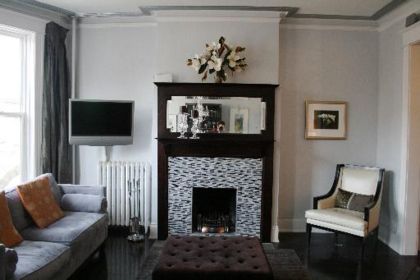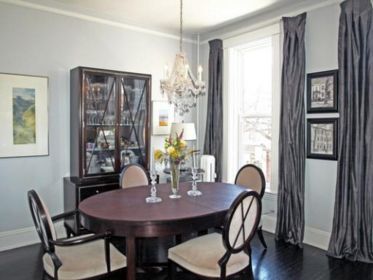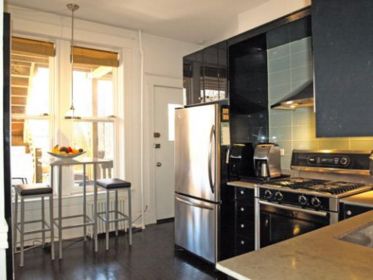Luxury Rehabbed Vintage: 2157 N. Seminary in Lincoln Park
This 2-bedroom vintage unit at 2157 N. Seminary in Lincoln Park has had its kitchen and 1-bath renovated with top of the line appliances such as Miele and Ann Sacks tiles. According to the listing, even the working fireplace has Ann Sacks tiles.

It also has new floors and windows. However, there’s no central air or parking with the unit.



Diana Peterson at PMD Realty has the listing. See more pictures and a virtual tour here.
Or see it for yourself at the open house this Sunday, Apr 5 from 11:00 am – 1:30 pm.
Unit #B: 2 bedrooms, 1 bath, no square footage listed
- Sold in June 1990 for $154,000
- Sold in November 1992 for $235,500
- Sold in March 2004 for $270,000
- Originally listed in February 2009 for $424,900
- Reduced
- Currently listed for $409,000
- Assessments of $265 a month
- Taxes of $4152
- No Central Air
- Fireplace
- In-unit W/D
- No parking
- Living room: 17×12
- Dining room: 11×8
- Kitchen: 13×10
- Bedroom #1: 16×10
- Bedroom #2: 15×9
A 2/2 with parking and central air might get this but a 2/1 no air no parking?
Keep living the dream people.
LOL at the whole TV setup. Thats the kind of tackiness I’d expect at a Hooters restaurant.
And the paint around the border of the ceiling? It looks like duct tape.
I would have to agree that a 2/2 w/ parking could potentially get this, but not a 2/1, and a very small one bath at that (would not be conducive for a couple, let alone a family of 3!) Overall I think the property shows well, although I think that a smilar result could have been achieved without miele appliances and deisigner tile….probably could have saved several thousands on the reno.
I think its very pretty and well done, but they over-improved it for what it is, which is still a small 2/1 with no ac or parking.
But it has Ann Sacks tiles! Surely that is more crucial to “livin’ large in Lincoln Park” than a second bath or AC.
Let’s get our priorities straight people!
What’s funny is you can go to Tile Outlet on Fullerton and Western and get similar looking glass tiles for about 1/3-1/4 of the price of Ann Sacks.
When I see radiator heat, the first word that comes to my mind is luxury… well that or the barracks where I spent my high school years in military school.
The price of this place without basic amenities like central air OR parking is quite laughable to say the least.
“When I see radiator heat, the first word that comes to my mind is luxury”
Radiant heat is much nicer than forced-air, imo. Altho for it to be “luxury” it’s have to be in-floor radiant. Since it was a “total gut rehab”, they should have been able to make that happen.
It also seems to be a middle unit, which doesn’t help.
Much nicer how? The fact that it dries the hell out of the air? Or the fact that it takes up usable space in your place? Yeah if it was in the floor that would be great but in this case its just awful.
“The fact that it dries the hell out of the air? ”
Um, based on what? There’s no scientific basis for this.
I dunno the place looks like the style of the lady in beetlejuice movie.
having lived in primarily radiator – OLD ones, not the nicer in-floor mentioned above – heated apartments/homes my whole life, I will 100% concur that they are not luxurious.
On the positive side, the heat is less dry, and often they have built-in humidifier trays to boot.
However, they circulate heat extremely poorly, and in a climate like Chicago’s, to adequately heat during the winter often means you have a radiator so cranked it can cause a minor burn just from rubbing into it. But worse, they just waste a lot of space.
“Um, based on what? There’s no scientific basis for this.”
Based on personal experience! Or should I have used the scientific method and made some pretty spreadsheets for you on top of that?
Bizarre sales history… it appreciated 52% in 2 years and only 14% in the next 12? What’s up with that?
“Based on personal experience”
So, you have a built-in, precise hygrometer?
My personal experience is the opposite–that forced-air is more “air drying” than radiant heat, but I specifically didn’t say that radiant heat is “better because it dries the air less” because anecdotal points about facts–rather than preferences–are pretty pointless.
And, sure, most forced-air systems have humidifiers, but that’s separate from the fundamental effect.
“in a climate like Chicago’s, to adequately heat during the winter often means you have a radiator so cranked it can cause a minor burn just from rubbing into it”
That’s a really bad system then. Never had anything close to that experience.
The parking around here stinks – especially when DePaul is in session. And the noise the DePaul students generate – wow! And how about that great back deck/porch, you only share it with all your neighbors. Way overpriced.
That’s just like, your opinion… man.
Its pretty obvious you’ve never had the joy of experiencing old, crappy radiators like some of us have.
Sonies is right on. I used to live in a place with old radiator heat and it had the worst dry air quality! I love waking up with bloody noses and having to buy stock in lotion companies (another story all together, don’t go there).
Radiant heat is great in the floor, there are no dry air issues that I know about, but radiators suck!
“Its pretty obvious you’ve never had the joy of experiencing old, crappy radiators like some of us have.”
And you must not have experienced old, crappy GFA, like I have.
I do agree about the space consumption.
Sonies, I love that you never lose the “don’t confuse me with facts attitude”
If radiant heating doesn’t heat the air then how the hell can it dry it? So basically winters for you gringos are just dry and you’re confusing correlation and causation.
Best heat I ever had was in my loft in NYC. Radiator probably 100 years old. Had to keep windows open all winter.
Nowadays… what’s a heater? 🙂
“Radiant heat is great in the floor, there are no dry air issues that I know about, but radiators suck!”
Dude, there is *NO* *DIFFERENCE* in the effect on the moisture in the air b/t radiant heat in the floor versus cast-iron radiators. And the only difference b/t radiant heat and forced-air (assuming the same effective in-room temperature) is from the air movement with forced-air (which is extremely negligible).
It’s all perception–unless your GFA system has a humidifier, but then I can set up a humidifier in my house, too, so we’re back to no (real) difference.
Also, I like radiant heat better b/c it’s quieter and there’s no breeze.
I also think (opinion only) that the heat is more even across the room.
My radiator hissed like a motherf’er and knocked and banged and overall stunk. I prefer the constant hum of a GFA. But like I said, the radiators in the barracks that I lived in was probably 100 years old. I’m sure the technology has improved greatly since then. But I certainly don’t miss the bloody noses with my current GFA. Then again I barely use the heat in my new place since the frickin sun heats up my place so much now.
I’ve got anon’s back on radiant heat. There is no plausible scientific explanation for why radiant heat would dry the air. To remove moisture from the air, a surface would have to be cold enough to cause condensation (ever see a dehumidifier in action?), the exact OPPOSITE of the situation with radiant heaters.
Really old, poorly maintained radiator systems with no in-unit temperature control aren’t great. I’m currently living in a building with such a system and they are loud and hard to control. Modern, in floor radiant heat is the way to go, IMO: no rushing air, no noise (either from fans or from radiator knocking) and very even heating.
Its neither, winter is what removes the moisture from the air, since colder air holds less moisture. A well taken care of radiant heater will not make noises, etc. But force air can dry you because it cause air to move across your body, and since the humidity is lower than the air around your body it can cause you to dry out faster, but the effect is negligible compared to the winter environment as a whole.
In my opinion radiant heat is better as long as u put a lot of money into a energy efficient boiler. otherwise forced air heater that are energy efficient cost less money.
Have living plants help the humidity in your house a bunch 🙂 As you heat your house the plants and the soil lets out moisture, with moisture in the air, air can warm up and hold more energy, so it take longer to cool out.
seriously, wait. arent you guys getting “radiaTOR” and “radiaNT” mixed up? they’re two seperate things.
am i missing something here or do people just like to argue w/o reading? (unless i guess the radiator is the hot water type under the floor, which the picture obviously proves otherwise)
bunt: radiaTOR and radiaNT heat are two animals of the same breed. More specifically, radiator heat is a specific type of radiant heat.
The idea behind radiant heat is simple: heat an object in a room, which will then give use its “radiant energy” to heat the room. You can heat any object to acheive this effect, but the consensus is that using lower temperatures to heat larger objects (floors, walls, etc) is better than using higher temperatures to heat smaller objects (for instance a radiator). The term “better” here ignores cost, which can be significantly higher in in-floor systems.
This is opposed to, for instance, convection heating which heats air and then blows that hot air around the house. Any forced air heating system is really a type of convection heating system.
I believe radiant heating involves piping with heated fluid running under a floor, so, in the sense liquid is involved they are similar.
radiant heating is supposed to be the best for a few reasons – first, hot air rises. this means instead of heating your ceilings you are getting the heat where you’re more likely to enjoy it. second, GFA is expensive in terms of electrical usage to run the blower.
but I really dislike the old school radiators, I’ve never found them to circulate heat properly nor to be fine-tunable, accurately, to a degree the way GFA is.
however, with a piece of cast-off granite on top I’ve found they make nifty porch furniture.
“The term “better” here ignores cost, which can be significantly higher in in-floor systems.”
are you talking about installation or operating?
my understanding is they cost more to install, but can quickly recoup the difference via efficiency.
skeptic: i was referring to install. i have also heard they are cheaper to run in the long haul (so long as you have an efficient boiler).
There is a big difference between steam and hot water heat. Hot water heat has larger radiators or can be in the floor with pipes. Hot water heat is not noisy, nor does it get hot enough to burn skin when touched. Steam heat is another story and is often loud due to imbalanced or poorly maintained radiators.
I’ve experienced all types of heat and the in floor hot water heat is the best, as it radiates the heat and allows the heat to rise, and feel oh so good on the bare feet. Hot water heat is very expensive (and not done in most new houses) as a separate air system is necessary to cool. If you find a house/apt/condo with hot water heat (even with radiators) and central air (Spacepak or typical ductwork), feel lucky as you have the best of both worlds: heat at the floor and cooling near the ceiling.
A person’s experience of dryness is related to relative humidity. If no one adds any moisture, a room that is heated, will (since hotter air could hold more moisture) feel more dry (or, in terms of what we feel, more moisture will evaporate from our skin and mucal tissue). In this sense, there isn’t really any difference between the different types of heat when considered as an average across the whole room.
However, tossing in the faster convective heating from a forced air unit, compared to the slower convection (because radiant units aren’t really so much radiating heat to you, but rather warming the air, and then the air transmits the heat, which is more appropriately called convection) from a radiator, the average difference of relative humidity on one’s skin vs the air going across it is higher, therefore, it will generally “feel” dryer, although, when considering the room at a whole, it isn’t necessarily so (if one gets out of the warm air flow).
My god. I will never get the five minutes of my life back that it just took me to read these posts. Thank you for all wasting my F’ing time arguing about radiators. I jump on here to see what is being discussed and talked about in regards to REAL ESTATE. Cant you little bitches just get together and claw eachothers eyes out about things that dont really matter someplace else?
John(JCL)
I will enjoy the 5 min you lost, I will f-it all night long.
I feel the conversation was relevant and educational
I actually thought these posts were interesting bc I forbid my realtor from showing me any places with radiators during my search. Now, I wonder if that was all just based on bad experiences in college. For one thing, have always felt that radiators made my allergies 100x worse. I had them mostly in college / early apts. GFA noise, however, is its own issue….since developers love to put cheap (aka loud) HVAC systems in insulation-free rooms in the middle of condos. I am not sure if GFA improved my allergy situation but it seemed to help the gross dead-air funky-ness i’d walk into when coming home. IMO, the best system (which is mostly in suburban homes…specifically tailored this way) will have an HVAC that will mix a lot of outside air with the existing air…and filter it. This requires more energy and is more expensive of coruse but you get better air quality. I just feel like radiators (AND radiant heat) just keep re-heating the same nasty air and allergens / indoor air pollutants. I have a sensitive nose though.
The humidity problem happens in both worlds, except more modern HVACs have humidifiers on them…if they work properly.
“I will never get the five minutes of my life back that it just took me to read these posts. Thank you for all wasting my F’ing time arguing about radiators.”
And thanks so much for YOUR invaluable contribution to this discussion.
If it took you five minutes to read the posts or figure out they weren’t of interest to you, you probably can’t understand most of the discussion on this board anyway, so why bother reading it at all?
JPS: No matter how off topic the conversation may be, the most disruptive and least valuable posts are always those whose only purpose is to complain.
Chill out, man. If a few posts on heating systems is really enough to ruin your day, you probably need a spa day. 😉
Sorry, that was meant for the _other_ guy with J in his name. Need more coffee…
i have in-floor radiant heat – it totally rocks. The warmth travels from your feet through your entire body.
I would put it in every house i ever own, if possible, but i don’t think it’s a practical retrofit. It’s an easy and a great thing to put in bathroom floors if you are putting in new tile floor, using electric rather than hot water.
“I jump on here to see what is being discussed and talked about in regards to REAL ESTATE”
for 99% of humanity, issues like heating are not extractable from the larger issue of housing, aka real estate.
this depression is a bummer, but seeing turkeys who used to see real estate as a commodity only to be bought and sold (as opposed to, you know, LIVED IN) being dragged back down to earth is a nice silver lining. It’s the flippers who bear a LOT of blame in the larger mess we have now.
I love in-floor radiant heat, too–agree that it is the best experience. HOWEVER, I have always wondered–what happens when it breaks? Don’t you have to get a whole new floor? Can it be repaired at all?
Kenworthey – By repair i assume you mean repair the in-floor tubing that runs the hot water. It can be repaired. the old systems are copper piping so that would need to be soddered. The newer systems are pvc (or something like that) piping which is easy to repair).
1st problem with either type of piping is that a bunch of the water in the pipes will leak and ruin ceilings, etc. 2nd is that the tubing is typically placed in concrete slab. so you have to crack the slab to get at the pipe. which means you have to rip up the flooring to get to the concrete.
so as you can see, repairs would not be easy or cheap.
Thanks, bubbleboi–that is much as I figured. It would be, in other words, a disaster if it broke. However, if it virtually never breaks, then would be a risk worth taking. Do you have any sense of that?
“if it virtually never breaks, then would be a risk worth taking. Do you have any sense of that?”
How often do your (or anyone’s) pipes leak in the walls (barring freezing)? Same thing, different location, so if it’s installed by a genuine pro, and checked properly before encasing it, there should be minimal real risk.
how much would installing an electric heated floor with say marble tiles run you, would you be able to do it yourself, and is it energy efficient at all?
“how much would installing an electric heated floor with say marble tiles run you, would you be able to do it yourself, and is it energy efficient at all?”
1. Not sure, but I can quickly find 3’x8′ electric mats for $270.00 each. They can be linked together to fit your space. You’d also need a control unit.
2. Yes, you could do it yourself, if you’re moderately competent with electric and tile installation.
3. Much more energy efficient if you insulate underneath, which would make the install more challenging. Otherwise, it’s more or less like running a small space heater–appears to be ~10 watts/sf.
Once had a workman puncture a copper pipe running through a concrete floor. The leak was a small fountain until the water was shut off. We got a plumber within an hour to chip away the concrete and solder the hole. Concrete filler leveled the concrete afterwards. Minimal cost and damage due to only having carpeting. The water drained outside and into the basement.
But, a leak can go on for quite a while and cause significant damage, especially if one is away and the source of the leak is not known.
The ask price on this listing is redonkulous. Ground floor, radiant heat, ugly fireplace..
No A/C and no Parking make Homer … something, something.
Go crazy???
Don’t mind if I do!
What is a good price per sq ft for Lincoln Park?
tree lined – new construction/older
main street – new construction/older
Love the decor and designer style. Perfect for professional couple. I think this place is gorgeous…will sell quick.
I think this unit is quite tasteful, really. Great light and lots of pretty finishes… yummy!